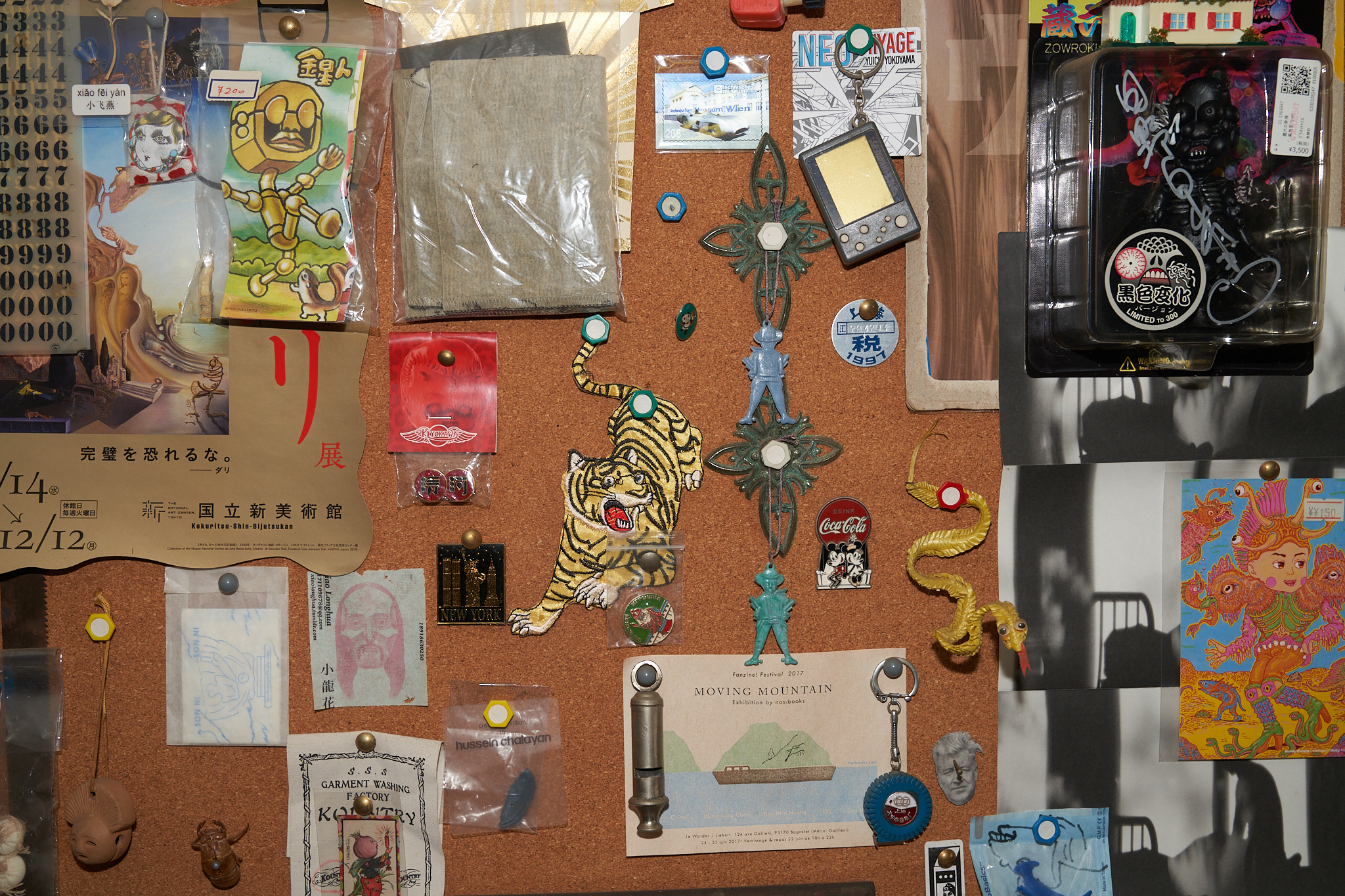OPEN MATRIX: ZOOMIN’ NIGHT AT FIVE YEARS
| October 28, 2014 | Post In LEAP 29
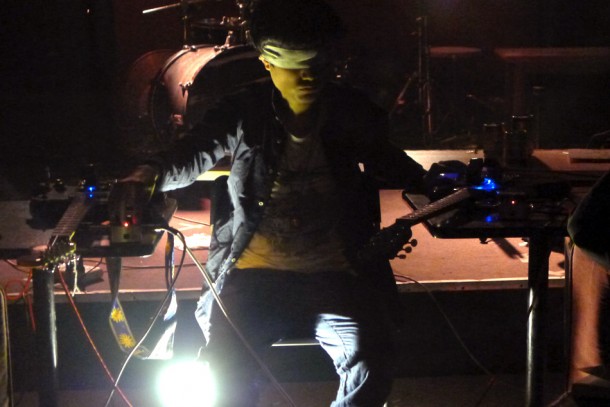
Zoomin’ Night’s name betrays its roots in a specific culture of post-2000s Beijing rock music. “Zooming” has nothing to do with it: the English name of the weekly experimental music performance series is a loose transliteration of zaomianye (燥眠夜), a song by Beijing underground veterans P.K.14.
There isn’t much nomenclatural logic beyond this simple fact. Zoomin’ Night curator Zhu Wenbo, who’s had a gig on almost every Tuesday night for the last five years, is simply a fan. Now in his early 30s, Zhu Wenbo trained as veterinarian before his passion for music overtook his career.
A longtime follower of the darker strains of Beijing rock — P.K.14, with their poetic, dystopic brand of post-punk being key originators — Zhu was an instant regular at now-defunct Wudaokou rock club D-22. Recognizing his potential as a musician and maven, D-22 founder Michael Pettis asked Zhu to organize his own series in 2009. “He [was] constantly bringing in new and interesting musicians,” Pettis recalls, and had established himself as a trusted sounding board for by-then established artists like Carsick Cars / White+’s Zhang Shouwang. “It was pretty clear to me,” Pettis says, “that if I just gave him the space and freedom to do whatever he wanted, he would put something interesting together.”
Thus Zoomin’ Night began, as a byproduct of Beijing rock. In its five years of steadfast boundary blending and conscious aversion to classification, it has morphed into one of Beijing rock’s most vital experimental substrata: a matrix.
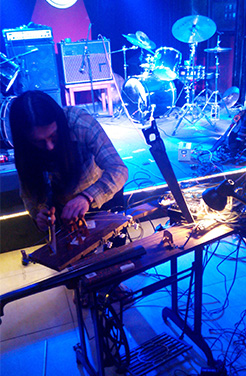
Zoomin’s palette of deconstructed post-punk, noise rock, minimalist improvisation, and other sundry sound waves grouped together under the dubious rubric of “experimental music” was arrived at as arbitrarily as its name. At its start, Zoomin’ Night was simply a catchall for emerging Beijing bands and individual musicians too abrasive or potentially alienating to be featured in weekend slots alongside the storied venue’s indie rock staples. The first Zoomin’ featured an early performance by Zhu’s own band, Fat City. He has remained the sole constant, the experimental control.
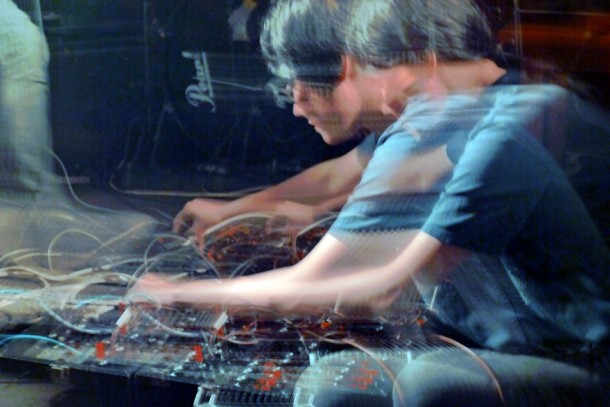
“Zoomin’ Night is a platform,” Zhu elaborates when pressed for definitions he’s reluctant to supply. He goes on to note that the one theme unifying any given week’s show is openness. A few typically atypical performances have included Shouwang staring at his guitar for an hour, barely moving; a classically trained violinist nearly crushing her fiddle to dust; a British tourist performing show tunes on an iPad while stripping down to a spandex leotard; a high-school-aged Beijinger giving his first live performance despite a complete lack of musical training. If there is any such thing as a standard Zoomin’ Night set, Zhu Wenbo’s own solo performance one Tuesday last September would be close: he sat, back to the audience, for 20 minutes, slowly crafting a dense sonic bricolage using a snare drum, contact microphone, and software synthesizer.
The presence of the snare drum is a telling index of Zoomin’ Night’s position within Beijing’s live music landscape. Zoomin’ Night comes from and reverts back to the rock scene. It is certainly a home for experimental music: an experiment can only be considered as such if there is conceptual space reserved for unsuccessful ideas, and Zoomin’ Night is defiantly failure-friendly. But its core group of musicians, even its name, derive from a superstructure inextricable from the social and economic development of rock music as a viable vocation for 21st-century Chinese youth. While Zoomin’ Night does not typically feature full bands on its roster, it provides a crucial developmental space for colliding, elemental particles that lead to later, finished works from some of Beijing’s most progressive rock groups.
One useful proxy for gauging Zoomin’ Night’s piecemeal development is the genre-defying duo of Li Weisi and Li Qing, integral members from its beginning. These two began their musical collaboration as the original bassist and drummer, respectively, of Carsick Cars, and as founding members of minimalist post-punk kosmische trio Snapline, eventually settling into a self-made world of minimalist sound sculpting under the opaque moniker of Soviet Pop.
Soviet Pop, as a band, has no specific style, no consistent instrumentation, no songs to speak of outside of a handful of one-off studio improvisations self-released onto cassette. Some of their shows are transcendent displays of rigorous anti-virtuosity; others are excruciatingly boring. Though Soviet Pop’s minimalist soundscapes feel as natural in a gallery context as a dive bar, what they do is still more accurately considered music than art. Soviet Pop’s Zoomin’ Night performances are the creative matrix underlying the continued progression of Snapline, a band still actively touring and playing music festivals for their cult following within China and abroad.
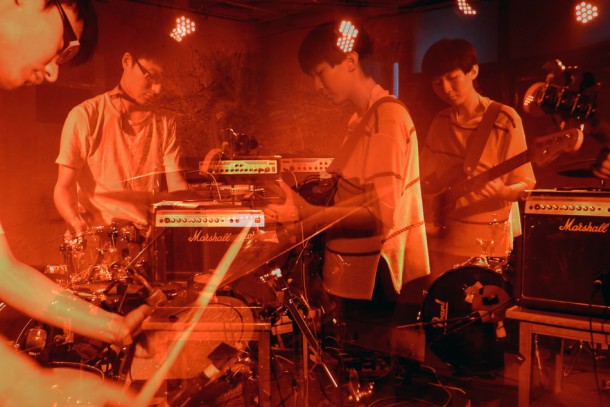
In recent years, Zoomin’ Night has become an essential node within the city’s fractured experimental music network. Critic and artist Yan Jun, who in large part shaped Beijing’s incipient experimental music culture through his own long-running Tuesday night series, Waterland Kwanyin, has begun including core Zoomin’ artists like Li Qing and Li Weisi in his Miji series of live “improv committees.”
And the flux goes both ways. While Yan Jun has picked elements from the Zoomin’ matrix and placed them in other contexts, another of China’s earliest and most established experimental musicians, Zhejiang-born guitarist Li Jianhong, has embraced Zoomin’ Night as a new home field. Li and his wife, laptop improviser Vavabond, moved to Beijing in 2011, immediately embedding themselves within Zoomin’s social structure. They followed the migration of Zoomin’ Night to Di’anmen experimental music incubator XP after the January, 2012 closure of D-22, and have since become weekly fixtures.
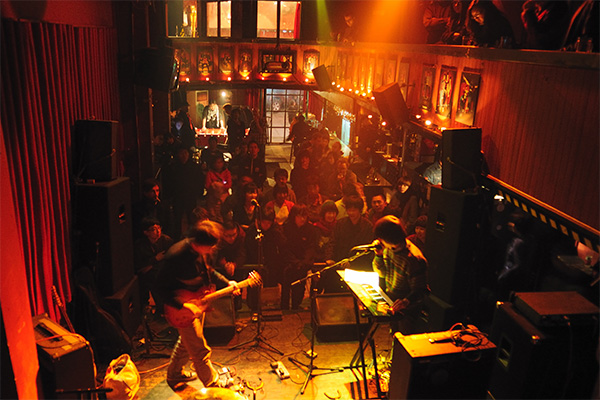
Zoomin’ Night passed its fifth anniversary in August with no fanfare, no celebration, no announcement. Instead, Zhu Wenbo and Tianjin free jazz saxophonist Wang Ziheng launched a new sub-series called Party is Over: a string of solo improvisations featuring Wenbo, Ziheng, and a handful of other Zoomin’ Night mainstays. There was no acknowledgement of the milestone beyond this, a show that could have happened in 2009 as easily as in 2014, with only a minor change in personnel. When asked what the future holds for Zoomin’ Night, Zhu replies: “I don’t know. There aren’t really any new faces.”
The ranks, as ever, remain open.
